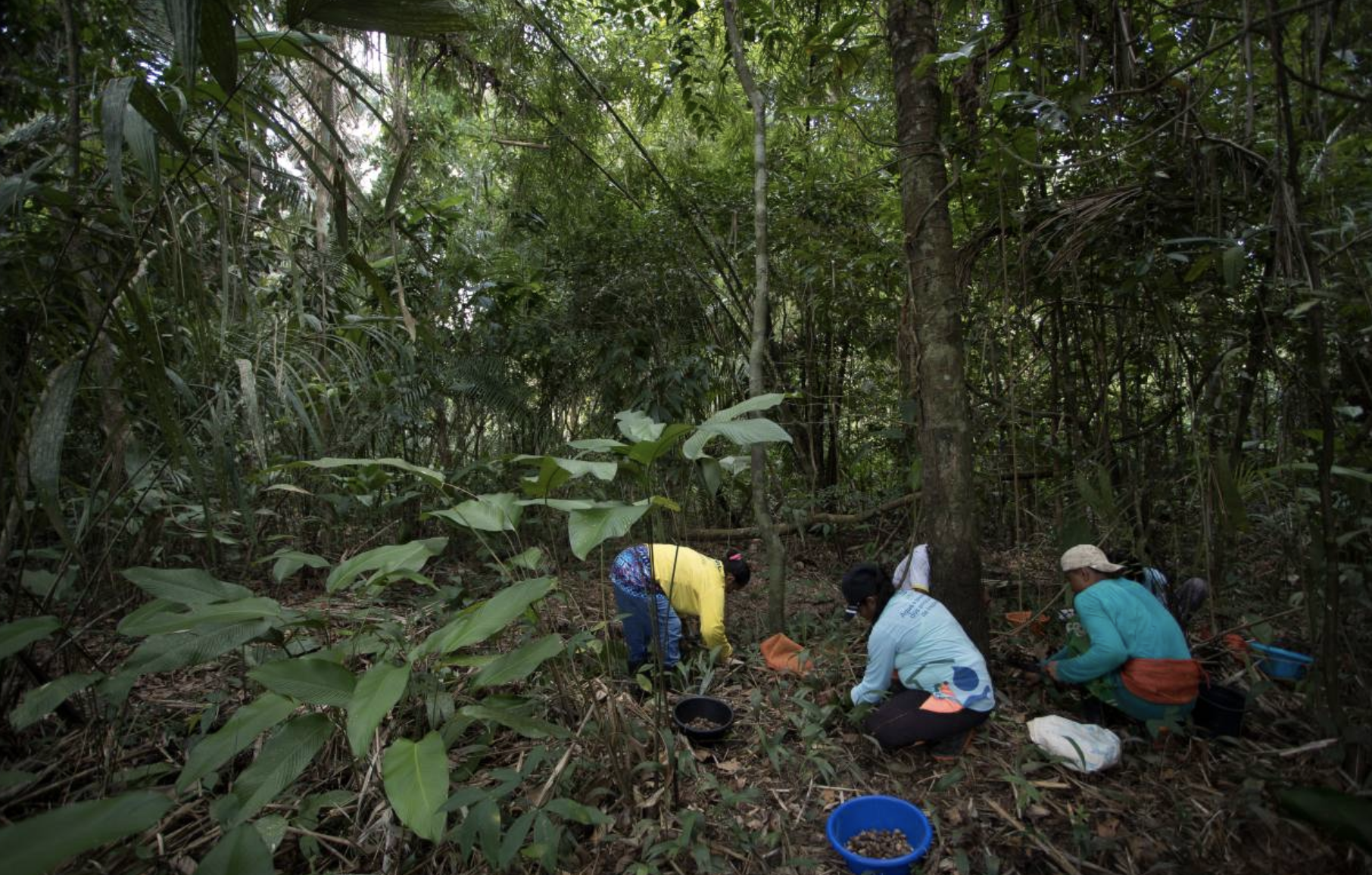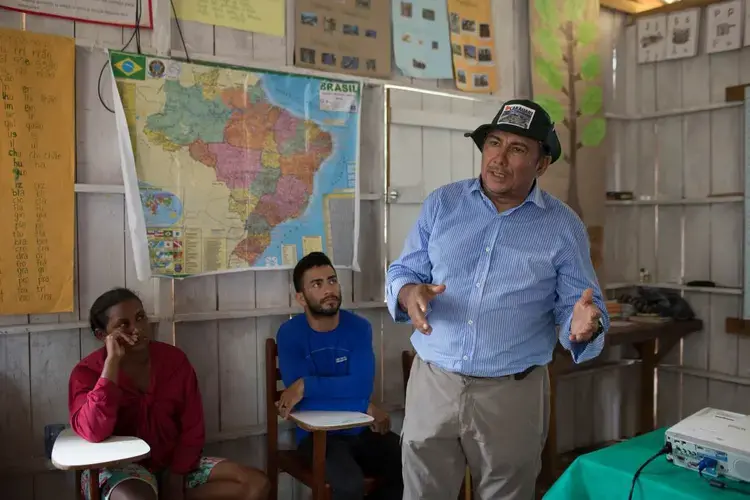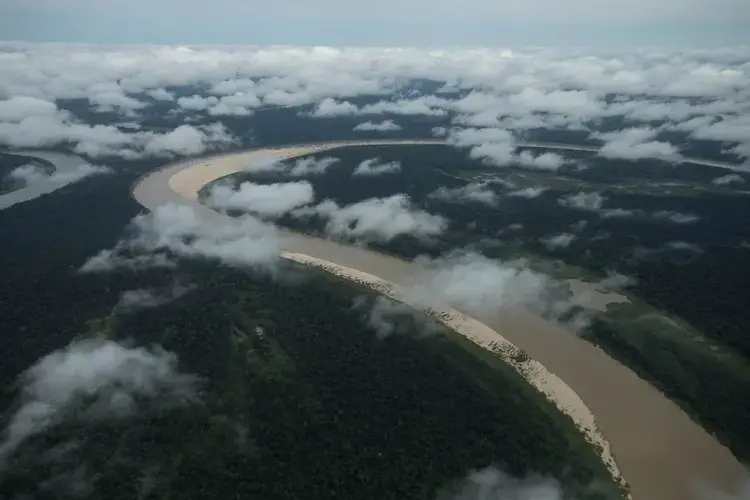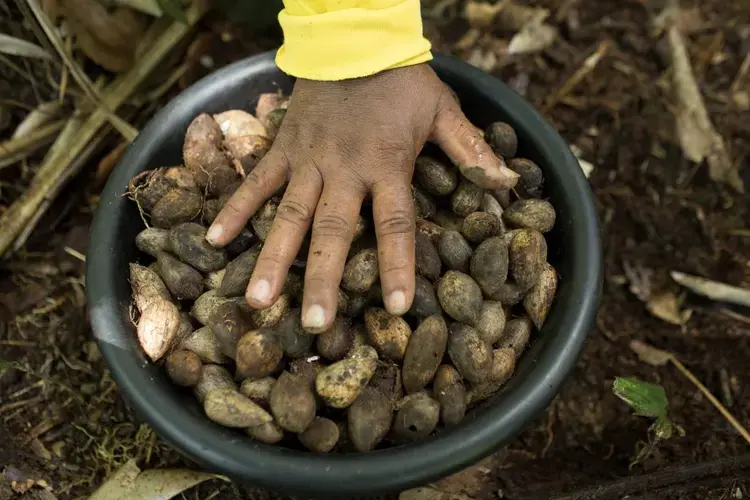
CARAUARI, Brazil, Aug 18 (Thomson Reuters Foundation) - As the dry season got underway in the Amazon rainforest this month, it brought a new wave of fear to inhabitants of the Middle Juruá Extractive Reserve, a conservation area in Amazonas, Brazil's largest state.
In his 52 years, Manoel da Cunha, manager of the reserve in Carauari municipality, said he had never seen the water level so low in the Juruá River. His 88-year-old father, one of the region's oldest inhabitants, agreed.
"We are afraid of severe drought of the river. Many communities are at risk of being isolated. Have you thought of that happening during a pandemic like this?" said da Cunha, noting that they could become trapped without river transport.
In Brazil, the COVID-19 outbreak has killed more than 108,500 people so far. But the Middle Juruá reserve has yet to record any fatalities and work in its communities continues with measures in place to prevent infection.
The Juruá River's low level and sparse rain in the preceding months, however, are ringing alarm bells.
Most of the 2,000 residents of the environmental reserve grow food for themselves and to earn a living, which is permitted under Brazilian law. To clear the land before planting, they use a traditional technique: controlled burning.
"We fear, now that everything is very dry, we may suffer from major fires in the region," said da Cunha.
"The burning is done during the day, but we are afraid that the fire could 'escape' at night and burn the forest. Under these conditions, it would be impossible to control."
The forest stores all the natural wealth used by communities in this remote location, accessible only by boat or plane.
Their main source of income comes from collecting seeds from native Amazon forest trees, including the andiroba and murumuru.
At a small manufacturing plant in the community of Roque, one of the reserve's 14 villages, the seeds are transformed into a valuable oil for the cosmetics industry.
The plant has signed contracts to deliver 20 tonnes of andiroba oil and 15 tonnes of murumuru butter to a Brazilian beauty company this year.
"Everything comes from nature. We depend on it - that is why we preserve it a lot," said Maria José Pinto Costa, who coordinates work at the plant.

BURNING RISK
The fear that severe drought and fires could destroy part of the residents' source of income is backed up by science.
A report by Britain's Met Office Hadley Centre, Brazil's National Centre for Monitoring and Early Warning of Natural Disasters (CEMADEN) and its National Institute for Space Research (INPE) warned at least 359 protected areas in Brazil are at risk of burning and forest fires between August and October.
In 43 of them, the risk is considered very high. While the situation in the Middle Juruá Extractive Reserve is not in that category, it requires "attention," the report said.
Co-author Liana Anderson, a researcher at CEMADEN, said the climate models used in the study point to a 73% probability of decreasing rainfall between August and October in that area.
"Data also show that the number of burn outbreaks in the region has increased in recent years," she added.

CLIMATE CONCERN
Reserve inhabitants worry that drought episodes like the one they are now experiencing will become more frequent.
For those who use the forest in a sustainable way, like the Middle Juruá communities, the danger of environmental imbalance presents a direct threat to their survival.
"We discuss climate change a lot here," said da Cunha. "It is something that we are very afraid of. After all, what we take as a community ... comes from natural resources."
For the Amazon, a 2014 flagship climate science report from the Intergovernmental Panel on Climate Change (IPCC) projected a rise in the average temperature of above 4 degrees Celsius and a reduction in rainfall of up to 40% by the end of this century.
Measurements show that the temperature across the whole Amazon region has increased by 0.7C since 1949.
Scientist and IPCC author José Marengo said the dry season had also become longer in recent decades.
Scientists cannot yet say whether the current drought in the Middle Juruá Extractive Reserve is related to climate change. But studies predict global warming will intensify extreme weather around the world, including dry spells and heavy rains.
Gilvan Sampaio, coordinator of the Centre for Weather Forecasting and Climate Studies at INPE, said the Middle Juruá region will suffer most from the rise in temperatures.
"Where residents depend on nature, climate change will cause more deaths of trees and species that can cause losses in extractive activities," he said.

FEWER FISH AND SEEDS
The Middle Juruá reserve is home to about 400 families, many of whom arrived after 1900 to make a living as rubber-tappers.
"We used to collect latex from the rubber trees at the time of the 'patroes' (land-owners). We were obliged to sell the entire production to them," said Sebastião Pinto de Sousa, one of the reserve's founders.
These self-proclaimed bosses expelled workers who did not obey orders and provided over-priced food in exchange for latex.
Influenced by the Catholic Church, the rubber-tappers began to organise themselves, seeking freedom.
Inspired by labour leader and conservationist Chico Mendes, they fought until they won approval from the federal government to establish the reserve in 1997.
While they adapted to flood and drought patterns on the Juruá River over time, the area's traditional inhabitants said everything had changed in recent years.
In 2020, for example, the river did not rise high enough in the flood season to reach the igapós, areas that are submerged part of the time, and fish did not migrate there to breed.
"We will get through the rest of the year with difficulty because fish is our main food," said da Cunha.
Community members also expect fewer tree seeds next year. "Our production will likely drop by half," predicted da Cunha.
Sebastião Feitosa da Costa, president of the Middle Juruá Agro-Extractive and Energy Development Cooperative, also warned of a shortage of andiroba seeds.
"We know this from the experiences of older people," as they have seen it happen in other dry years, he said.
That is why contracts with the cosmetics industry have a clause exempting the seed collectors from fines if they cannot meet their stipulated quotas due to environmental conditions.
But there is one impact that cannot be avoided.
"Unfortunately, if the trees do not produce many seeds, there will be a drop in income for families because they depend on it," said da Costa.






